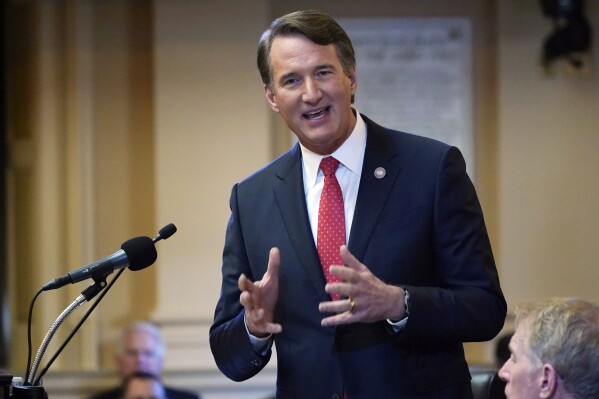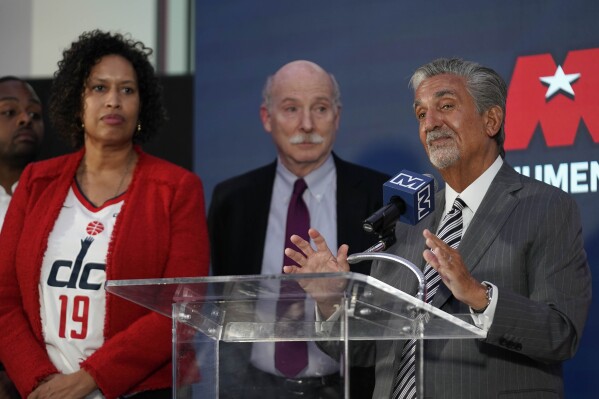Youngkin proposes ‘compromise’ path forward on state budget, calling for status quo on taxes
RICHMOND, Va. (AP) — Republican Gov. Glenn Youngkin and the Democratic lawmakers who control the Virginia General Assembly have spent months at odds over taxes.
The way to find compromise and get a new two-year budget done on time, Youngkin said Monday, is to set aside talk of cuts or increases for now and simply stick with the tax policy status quo.
In a speech in Richmond, the governor outlined a lengthy package of amendments to the budget the General Assembly sent him in March, including a proposal to eliminate a new lawmaker-backed sales tax on digital goods and services. He also laid out corresponding cuts to expenditures to account for the revenue lost from that change, though he said his proposal maintained the vast majority of lawmakers’ priorities, including 3% raises for public workers in each of the next two years.
“To be clear, we do not need new taxes. And again, for the sake of finding common ground, we won’t aim to reduce them this time,” said Youngkin, who had initially voiced support for the digital sales tax but paired it with a corresponding income tax cut for an overall reduction.
Youngkin cast his proposals as an olive branch, calling the latest iteration of the spending plan the “common ground budget.” His remarks marked a departure from the hyper-partisan rhetoric of the last few weeks when lawmakers and Youngkin were trading barbs over their budget differences and the failure of one of his top legislative priorities, a proposed pro-sports arena in northern Virginia.



The governor emphasized that he had not used his line-item veto power on the budget and said he hoped the more than 230 amendments he offered would be well received when lawmakers convene to consider them next week in Richmond. But at least one top Democrat quickly voiced skepticism.
Senate Majority Leader Scott Surovell told reporters after Youngkin’s speech that lawmakers would be closely scrutinizing the governor’s amendments to ensure that the budget remained structurally balanced and that the amendments “provide the level of services that Virginians expect, given the level of wealth and income and expectations of our citizens.”
The Assembly’s budget committee leaders, Sen. L. Louise Lucas and Del. Luke Torian, were set to hold a press conference Tuesday morning, where Torian said they would have a response to Youngkin’s remarks.
The state operates on a two-year budget cycle, with the spending plan initially adopted in even-numbered years. Lawmakers and Youngkin are currently working to come to terms on a framework that would begin with the start of the new fiscal year on July 1 and run through mid-2026.
The public process formally kicked off in December, when Youngkin unveiled his budget proposal, which offered a starting point for negotiations. In it, the governor called for a reduction to income tax rates paired with an increase to the sales tax rate and an expansion of the sales tax to cover certain currently exempted digital goods, such as streaming services.
The General Assembly, which convened in January, objected to Youngkin’s proposal broadly, saying it would mostly benefit the wealthy. But as they rewrote the governor’s plan, they did keep one piece of the tax policy: the proposed new levy on digital goods, which they also expanded to cover business-to-business transactions. That move drew a backlash from influential industry groups and one of them — the Northern Virginia Technology Council — issued a statement Monday praising Youngkin’s call to drop the tax.
The Youngkin administration said Virginia is in such a strong financial position, with a AAA bond rating, flush reserve fund balances and tax collections running ahead of forecasts, that increased spending on government services and priorities like teacher raises can be maintained without the tax increase.
The governor said his amendments, the full text of which was not immediately available to the press or public, would also:
1. Invest a record amount of spending, $21.2 billion over the biennium, in K-12 public schools, and increase spending on higher education beyond the previous budget.
2. Remove language lawmakers had inserted seeking to have the state rejoin a regional carbon cap-and-trade program.
3. Fully fund Virginia’s share of the Washington Metro system’s operating shortfall.
4. Provide toll relief for lower-income residents of Norfolk and Hampton and increase funding for improvements along congested Interstate 81.
Youngkin and his finance secretary, Stephen Cummings, said a series of accounting mechanisms — including shifting to paying for some projects with bonds rather than cash and postponing payments to some projects still in the planning phase — helped reduce the spending side adjustments necessary to account for the tax revenue changes. Youngkin also said he did not push to restore many of his own spending priorities the Assembly stripped out.
Some of the cuts Youngkin is proposing come from K-12 spending, though he emphasized in remarks to reporters that funding would still be increasing overall, there would just be less growth in spending.
Monday also marked the deadline for Youngkin to act on all other legislation sent to this desk. As of early evening, he had not announced his decisions on a wide range of remaining bills, including a proposal to tax and legalize so-called “skill games,” the betting machines that proliferated in gas stations and other businesses before a ban took effect.
Disclaimer: The copyright of this article belongs to the original author. Reposting this article is solely for the purpose of information dissemination and does not constitute any investment advice. If there is any infringement, please contact us immediately. We will make corrections or deletions as necessary. Thank you.





